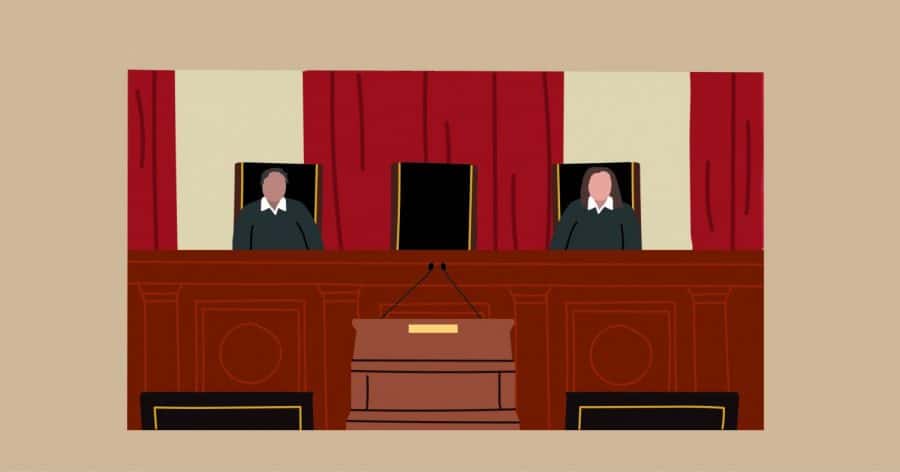Opinion | The ‘filling the seat’ debate is about more than the position
October 7, 2020
Americans gathered together to mourn the loss of Justice Ruth Bader Ginsburg on Sept. 18. Many distinct public figures, from President Donald Trump to former Vice President Joe Biden, released statements honoring her memory and legacy as a judicial icon. In a beautiful moment, the United States seemed more united than it had been in months.
Of course, in true 2020 fashion, that touching moment swiftly came to an end.
An extreme controversy was sparked by President Trump’s announcement of his plans to fill the vacancy despite the proximity to the presidential election on Nov. 3. People opposed to the notion have argued that the results of the election should determine the next Supreme Court Justice. During the Sept. 29 presidential debate, Joe Biden argued that the administration should wait before filling Justice Ginsburg’s seat, allowing the American people to “express their view” through voting. President Trump and his followers disagree.
“We won the election and we have the right to do it,” Trump stated, when asked the same question.
So far, the GOP seems determined to fill the vacancy and has already named Amy Coney Barrett as the nominee.
Of course, the real nail in the coffin of this debate was Senate Majority Leader Mitch McConnell’s opinion. In a statement released on Sept. 18, he promised that “President Trump’s nominee will receive a vote on the floor of the United States Senate.” It is not surprising that most GOP senators would support Trump’s decision to fill the vacancy, although a few Republicans did oppose the move. But McConnell turned many heads with his response; or rather, with his hypocrisy. For clarity, let’s look at a similar case with very different opinions: the nomination of Merrick Garland in 2016.
In March of 2016, following Justice Antonin Scalia’s death, President Obama nominated Justice Merrick Garland. His decision was met with a blatant refusal from Republicans, namely Mitch McConnell. McConnell declared that the nomination was too close to the election, and vehemently stated that “the American people should have a say in the court’s direction.” Additionally, because the United States had voted in a Republican-majority Senate in the prior midterm election, McConnell argued that it was their responsibility to block a liberal nomination. While Democrats opposed this blockade, they held a minority in the Senate and were powerless to overcome it. Ultimately, the Republicans’ refusal to vote on Garland’s nomination succeeded, and the seat was not filled until after Trump’s inauguration the following year.
Now we return to the present day and find that McConnell has completely changed his stance on waiting until after elections. Despite the upcoming Senate elections in November that could potentially change the Senate majority, McConnell has stated that there is “more than sufficient time to process a nomination.” This reveals yet another drastic change in stance, as McConnell used the Senate election as a reason for the 2016 blockade of Garland’s nomination. From these contradictions, a revelation emerges: the current debate has nothing to do with rights and everything to do with which party currently has control. The power that comes with the Senate majority allows McConnell to manipulate the system so that his party comes out on top. It allows him to claim that he is defending ‘the people’s rights’ in one case and then ignore those same rights four years later. For all American citizens, it should be worrying that a prominent politician is so willing to use the defense of people’s rights as nothing more than a chess piece in a game.
This is not a column meant to bash the right wing. If the roles were reversed, the same column would most likely be written about the left-wing counterparts. Politicians on both sides of the aisle have shifted further away from the people they represent as partisan tensions have grown. McConnell and the GOP’s changed stance is just the latest example of political hypocrisy veiled under a thin defense of the people’s rights.
It is currently a constitutional right for the President to nominate a jurist to fill the Supreme Court seat, just as is it for the Senate to block said nomination. However, the ethical implications should be enough for Congress to reconsider. There is no obvious answer, and while the nomination may go into effect this time, the future of presidential judicial nominations might change as the country does. Still, one thing is clear: the nature of this controversy has forced our politicians’ inconsistency into the spotlight, and those inconsistencies are unacceptable.
The American people deserve representatives who maintain consistent views on what the people’s rights are. Whether one agrees with those rights is another discussion, but Americans should not have to worry about their rights constantly fluctuating in order to fit the current goal of a political party. To put it simply: if we are told we have a right to be represented one year, that viewpoint shouldn’t change just because the political party in power does. And, to Mitch McConnell: Don’t use the rights of the American people to defend your actions unless you mean the rights of all Americans, and not just the ones in your party.










